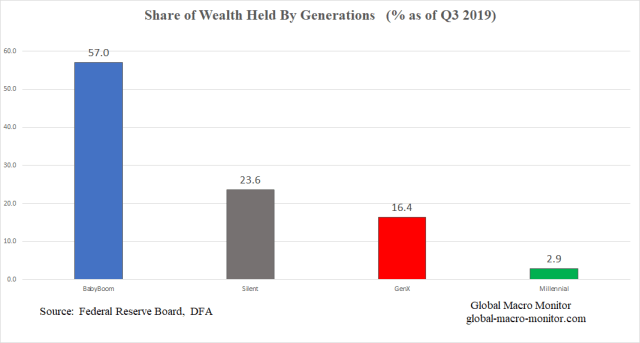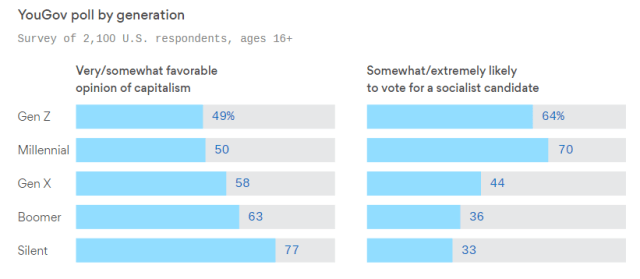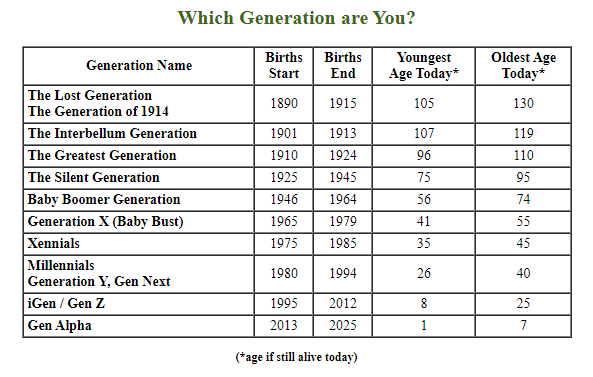The Global Macro Monitor has been writing about the Clash of Generations for years, and way before the headlines and data that are now starting to show up in the MSM. See here.
The fight taking place between the moderates and the progressives in the 2020 Democratic primary is just another manifestation.

The nation’s finances are almost as skewed toward the elderly as its politics are. Americans 55 and up account for less than one-third of the population, but they own two-thirds of the nation’s wealth, according to the Federal Reserve. That’s the highest level of elderly wealth concentration on record. The reason is simple: To an unprecedented degree, older Americans own the most valuable real estate and investment portfolios. They’ve captured more than 80 percent of stock-market growth since the end of the Great Recession. – Atlantic

Representative Alexandria Ocasio-Cortez is often described as a radical, but the data show that her views are close to the median for her generation. The Millennials and Generation Z—that is, Americans aged 18 to 38—are generations to whom little has been given, and of whom much is expected. Young Americans are burdened by student loans and credit-card debt. They face stagnant real wages and few opportunities to build a nest egg. Millennials’ early working lives were blighted by the financial crisis and the sluggish growth that followed. In later life, absent major changes in fiscal policy, they seem unlikely to enjoy the same kind of entitlements enjoyed by current retirees. – The Atlantic
We have put together a few charts to help explain the economics between this struggle. We are grateful to the economists and statisticians at the Federal Reserve Board for constructing their Distribution of Financial Accounts (DFA), which provides a treasure trove of data.
Go To The Charts
We will let the charts speak for themselves, and, yes, we get it. Younger generations are always less wealthy than the older ones, who have had a lifetime to accumulate assets, but wealth accumulation has become increasingly prohibitive for those just starting out in our age of serial bubbles.
We are hoping the Ms will not be sucked into this massive asset bubble.


Controlling For Population Ratios

The Washington Post’s Christopher Ingraham adjusts for this, pointing out that in 1990 “boomers owned 21% of the nation’s wealth and represented 31% of the population, for a wealth-to-population ratio of 0.68 — each percentage point of the total U.S. population represented by boomers, in other words, owned 0.68 percent of the wealth.”
And yet in 2008, “Gen X–ers owned 9% of the wealth and made up 22% of the population, for a wealth-to-population ratio of 0.41.”
Millennials by comparison, are on track to have an even lower wealth-to-population ratio than that. – MarketWatch
Upshot
When you have little or no “skin in the game”, why support the system? Burn it the F&@K down!
Don’t chase and let the markets come to you Ms. The fever will break and the bubbles will burst. Not a great way to reduce the wealth gap but it will provide an opportunity to accumulate assets at a decent price.

Source: Axios
What Generation Are You

Source: Career Builder


Among other factors, isn’t wealth, in general, a function of how long a person has lived, worked, saved, and invested?
If I was born yesterday, I’m not going, in general, to have very much wealth.
If I am a hundred years old, am I not, in general, going to have a better chance of having more wealth?
My proclivity for working and saving the fruits of my work are also important.
But if I just graduated, I am more likely to have negative wealth.
Good point, Hans, We address that in the post, looking at the wealth-to-population ratio:
“in 1990 “boomers owned 21% of the nation’s wealth and represented 31% of the population, for a wealth-to-population ratio of 0.68 — each percentage point of the total U.S. population represented by boomers, in other words, owned 0.68 percent of the wealth.”
The current Millenial wealth-to-population ratio is about 9.4 percent. The oldest boomer in 1995 was close to 50 versus the oldest millennial of 40 today. This isn’t even in the same zip code.